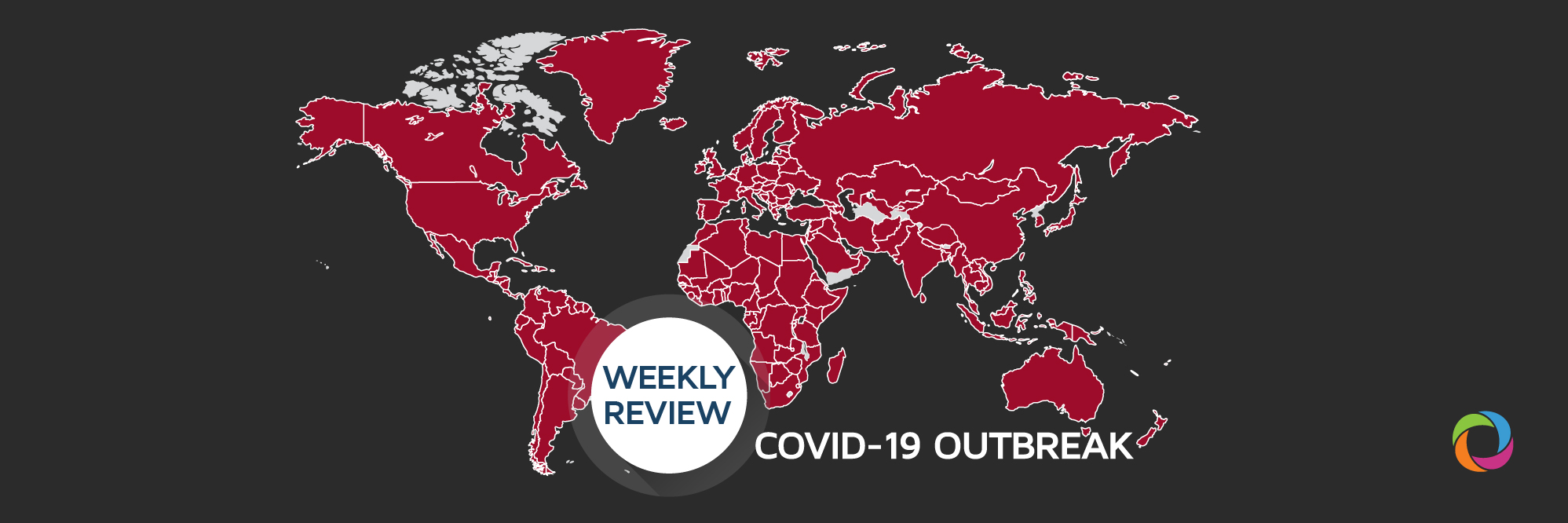(June 18 – 24, 2020)
Despite the grim record of 183,000 new COVID-19 infections in 24 hours being registered in the world on June 21, countries are seeking to open their borders to international tourists in pursuit of reactivating economies. At the same time, the World Health Organization urges a “double down” approach to fundamental public health measures while facing the delicate balance between protecting people and minimizing the social and economic damage caused by the pandemic.
Quote of the week: “All countries are facing a delicate balance, between protecting their people while minimizing social and economic damage. It is not a choice between lives and livelihoods. Countries can do both.”
WHO Director-General Dr Tedros Adhanom Ghebreyesus.
Globally, the number of coronavirus victims continued to grow during the last week and it took just eight days for 1,000,000 people to become infected. As of today, there are 9.2 million COVID-19 cases and there has been almost 478,000 deaths and 4.63 million recoveries, according to Johns Hopkins University Coronavirus Resource Center. The United States of America continues to be the most affected country with over 2.3 million infected people. Brazil and Russia are struggling to contain the spread with over 1.1 million and 598,000 cases registered respectively while an alarming statistic of over 10 thousand new cases daily has been registered in India for the past five days.
International tourism: To be or not to be?
The beginning of summer in the Northern hemisphere caused millions of European tourists to feel restless and eager to enjoy their annual vacations. Although accounting for over 30% of the world’s COVID-19 cases, the countries from this region have apparently managed to temper the spread of the disease and are gradually lifting restrictions on travel. According to the World Tourism Organization (UNWTO), Europe leads the way in policies intended to restart tourism. These include:
-
- Fiscal incentives (exemptions or deferrals of taxes – VAT, corporate income tax, etc.)
- Monetary measures such as special credit lines at reduced rates
- New loan schemes and state banking guarantees aiming at address liquidity shortages
- Targeted assistance for the small businesses which make up 80% of tourism sector
According to the latest UNWTO research, 33% of destinations in the European region have introduced tourism-specific policies. In Asia and the Pacific, 25% of destinations have adopted policies to restart tourism, while in the Americas this proportion stands at 14% and in Africa at 4%.
At the same time, globally, 22% of all destinations – 48 countries – have started to ease restrictions with Europe leading the way. However, 65% of all destinations worldwide (141 destinations) continue to keep their borders completely closed to international tourism.
Tourism is hit the hardest in developing countries where public health systems are struggling to address the challenges of the pandemic. Due to underdeveloped primary health infrastructures and limited resources in prevention and treatment of the virus, these countries cannot afford to allow foreign citizens to enter their territory.
Asked to comment by DevelopmentAid, Arta Istrefi, Private Sector Development and Project Management consultant said that the experience of lockdowns was worse for people living in developing countries compared to those in developed nations.
“The reason behind this is poor health management systems. However, due to lockdown, the private sector has been damaged drastically. Governments should encourage companies to start working at least at 70% capacity, support the private sector through wage subsidies, encourage local production over imported products through public tenders and campaign for “buy local products”, decrease the percentage of taxes for at least the first three months and continue to support capacity building though on-the-job training.”
DevelopmentAid asked international experts to comment on the impact of the coronavirus on the global economy and their opinions have been published in a separate dedicated article.
COVID around the media
-
- The International Trade Centre’s 2020 SME Competitiveness Outlook, launched this week, revealed profound disruptions to global supply chains. The document underlines the fact that the virus has particularly impacted small and medium sized enterprises (SME): almost 55% of SMEs confirm the pandemic has strongly affected their business operations.
- Online lotteries have been implemented in Adelaide Oval – a picturesque sporting ground in Australia – to limit the number of spectators, as the facility re-opened its doors to sports events and visitors. This, and other measures designed to tackle and adapt the sports events to the new corona realities, have been discussed during “Sports events and COVID-19: from lockdown to a new start” hosted by the WHO’s Information Network for Epidemics (EPI-WIN).
- EU-funded consortium Exscalate4CoV has announced that an already registered generic drug used to treat osteoporosis, Raloxifene, could be an effective treatment for COVID-19 patients with mildly symptomatic infection. The consortium is using an EU-backed supercomputing platform, one of the world’s most powerful, to check the potential impact of known molecules against the genomic structure of the coronavirus.
- Tarassud Plus is the name of an innovative system deployed in Oman to track the movement and spread of the coronavirus in the country. The system is a combination of a mobile application using artificial intelligence with enhanced features that include up-to-date COVID-19 statistics, guidelines and best practices to prevent the spread of infection. The application is available in Arabic, English, Hindi, Bengali and Urdu in an effort to cater to both citizens and residents in Oman.
The DevelopmentAid news team is working hard to keep you up to date with the most important headlines and events during the COVID-19 pandemic. Become a member and subscribe to our newsletter in order to remain fully informed about the latest news in the International Development Sector.
The next DevelopmentAid weekly coronavirus review will be released on July 1, 2020.
About COVID-2019 Coronaviruses are a large family of viruses that are common in many different species of animals including camels, cattle, cats and bats. Rarely, animal coronaviruses can infect people and then spread between them such as was the case with MERS (2012) and SARS (2003).The symptoms of the virus are very similar to those of a common cold – runny nose, headache, cough, sore throat, fever, a general feeling of being unwell. Blood tests are necessary in order to prove the presence of the virus in the organism. Named by scientists as the “Wuhan seafood market pneumonia virus”, COVID-19 is a coronavirus, like MERS and SARs, all of which have their origins in bats. Initial reports show that, in the early stages of the outbreak (early January 2020), many of those infected in Wuhan had some link to a large seafood and live animal market – the Huanan Seafood Wholesale Market, mainly its western wing where wildlife animals are traded. This suggests that the virus initially affected an animal and subsequently spread to a person in a what a CDC has called “the species barrier jump”.


